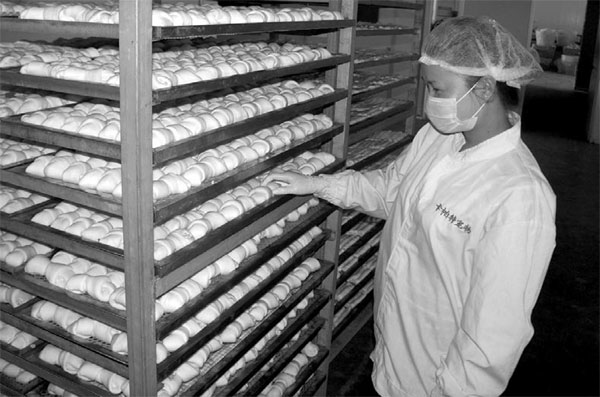Rough times ahead for dog treat and toy manufaturers
Lin Shila recently went to the Orlando Global Pet Expo and felt upset when he returned home.
As general manager of one of China's biggest pet toy companies, Jiangsu Carepet Pet Products Co Ltd, Walmart's dog chew toy maker, Lin found that few customers were interested in Chinese pet products, poles apart from its popularity a few years ago.
"I feel that there is some sort of potential boycott of Chinese products in the United States market," Lin said, adding that it does not appear the situation will soon change.
|
A worker at Jiangsu Carepet Pet Products Co checks dog chew toys. Provided to China Daily |
"I'm thinking of moving factories to South America to avoid the problem."
Made-in-China pet products have taken a hit after chicken jerky dog treats from Nestle Purina PetCare and Milo's Kitchen were found to contain six antibiotics that were not approved in the US in 2013. Those dog treats were suspected of causing the deaths of 1,000 dogs over a 10-year period.
Although subsequent investigations led by the US Food and Drug Administration were unable to confirm the link between the treats and the deaths through testing more than 1,200 chicken jerky samples, many Chinese companies have been impacted.
Jiangsu High-worth Industry and Trading Co Ltd, the factory that made chicken jerky brand Waggin Train for Nestle Purina PetCare, in Huai'an, Jiangsu province, lost 6 million yuan ($967,000) after their US partner stopped imports for 10 months, not to mention the damages from losing workers and aging machines.
Wang Jun, general manager of High-worth, said the factory has tried many ways to remove people's doubts of their products after the incident. "Chicken jerky is a very simple product. It's made of chicken chest and glycerol only," he said.
Now the factory has invested in a local chicken farm and uses imported glycerol to ensure every ingredient of the product is traceable.
"We used to make other products for Nestle, such as more complicated dog treats with duck meat and beef. But to be safe, we only make chicken jerky now."
Wang's factory is currently under remodeling to meet higher sanitary standards. When it's done, he plans to try one or two new products.
According to Wang, Nestle is the company's only client in the US. Through their distribution channels, High-worth's products are sold in big supermarkets such as Walmart, Costco and Target.
Each year, the company manufactures about 2,000 tons of chicken jerky, worth $23 million.
"There is nothing we can do if Nestle stops imports. We can't sell our products in the Chinese market because our cost is too high to compete with domestic dog treat makers."
In fact, the double standards between Chinese domestic market and overseas markets have been a problem for pet product makers for a long time.
"Dog treats are inspected as animal feed in the US and many other countries. However, they are labeled as dog toys in China, which means products sold in the domestic market do not need to meet the standard of food," said Wang Jinquan, associate research fellow of the Feed Research Institute, Chinese Academy of Agricultural Sciences.
Wang said there is still small demand for pet treats products in China at present because it is expensive.
Chinese pet treat makers are mainly selling their products to the US and Europe.
"But as more middle-class families have pets, the demand for pet treats will increase very soon, and the lack of regulation will cause real problems."
Wang said that the Feed Research Institute is drafting a regulation of pet food, which will be done by the end of this year. "Pet treats might be included in the draft," he said.
With the pressure from US buyers, Chinese exporters are trying to expand in new markets.
Zhang Ke, deputy director of the animal and plant division of Huai'an Entry-Exit Inspection and Quarantine Bureau, said recently exports to Europe have increased a lot.
"The US, which takes about 50 percent of the global pet product market, was the priority. But now more and more companies are turning to Europe and other countries."
Although the incident in 2013 was a heavy defeat for the Huai'an National Pet Food Safety Pilot Zone, which houses major export companies, Zhang said the local inspection bureau rallied quickly, including setting a new service station inside the pilot zone, helping the exporters to know better in their quality control process, and design safety supervision methods based on the different conditions at different factories.
"We hope the pilot zone will attract all kinds of companies in the pet product industrial chain, not only dog food and treats, but also cat litter, pet cloths and dog rope," Zhang said. The pilot zone will be more appealing to foreign customers if they can purchase everything related to pets in one place."
Despite all the difficulties, Carepet's Lin has figured out a way out of the slump.
Starting this year, his company will sell a new product in the US that wraps chicken jerky around chew toys.
"Dogs love it," Lin said. "We need to keep making new stuff. If my product is the only choice on the market, there is no competition."
benyue@chinadaily.com.cn



















